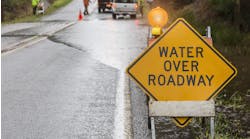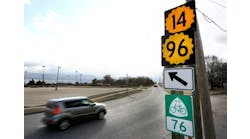Foamed asphalt is a "natural" for rural Ulster County, N.Y., where the local economy depends on unimpeded tourist traffic to Ulster's scenic Catskill Mountains north of New York City.
This process--now gaining popularity across North America--lets Ulster County keep its roads open to local and tourist traffic while they undergo complete recycling and stabilization as base material prior to overlay.
Excessive, weeks-long truck traffic, demolition material and virgin aggregate hauling, noise, dust and commotion are eliminated, and a virtually new, high-performance road base is created at a fraction of the cost of new base materials and deep lifts of asphalt pavements.
In-place recycling of rural roads with foamed asphalt lets Ulster County reconstruct far more roads each season than would otherwise be possible, letting precious road dollars go further. This is even more important as Ulster is undergoing a residential boomlet as urbanites bypass New York City's suburbs to build year-round homes there to escape the hectic urban life.
And the minimal environmental impact of in-place recycling means less disruption to tourists and outdoorsmen who come to Ulster County for its quiet peaks, deep woods and cold lakes and streams.
Keep the roads open
"Our policy is to try not to close the road under construction," said John Lukaszewski, field operations manager, County of Ulster Public Works, Department of Highways & Bridges, Kingston, N.Y. "It's a public safety issue. Sometimes we have to temporarily close a road, but the notification procedure is involved and we'd rather keep it open."
Foamed asphalt gives Ulster County that option. "All traffic can continue as normal, with a little bit of delay, that's all," Lukaszewski said. "Citizens stay happy, and when taxpayers are happy, that makes us happy and helps us do our job better and faster."
"In the long run this process saves tax dollars," said Ulster County Commissioner of Highways & Bridges James Donahue. "It provides a great sub-base, and anything we'll put on top will last that much longer, with much longer-term savings over the years. And the road stays open for residents, deliveries and emergency vehicles."
Ulster County has been using foamed asphalt for at least five years, but has been doing road reclamation and recycling for about 16 years. "We've had a nice outcome with foamed asphalt," Lukaszewski said. "Instead of having to put an asphalt binder down, it gives us our binder in-place, and we just have to come back and top with a clean 1-in. top-size blacktop, 3 in. deep."
That first foamed asphalt job has held up well, he said. "It's a fairly high-volume road for us, about 5,000 vpd. It's done very well and we're really happy with it."
Foam = lightweight cost
Being a rural county, Ulster lacks a strong tax base. Road and bridge expenditures come from the county's general fund--with some federal assistance--and thus compete with other worthy needs. The county maintains about 900 lane miles of roads, for a population of 140,000. The county needs to save money without cutting corners wherever it can, and foamed asphalt does the trick.
"The savings with foamed asphalt are enormous," Lukaszewski said. "We'd have to dig up and get rid of the material and truck material back in. On a project like this one, we're saving hundreds of thousands of dollars. Economically it fits the bill. Money is the big issue. If you don't have the money, you can't do the work. So we work with what we have."
The county now reclaims and foams in excess of 20 miles each year.
"We've tried liquid calcium chloride stabilization, and it does a good job, but it's kind of a mess," Lukaszewski said. "It's good for dust and stabilizes clay somewhat, but people don't like to hear you're using calcium chloride in rural areas where they depend on wells."
Expanding on asphalt
Foamed, or expanded, asphalt offers new options for contractors and state and local road agencies to undertake economical base stabilization.
Low-cost foamed asphalt technology stabilizes and improves the performance of existing road materials, producing high-quality base courses and cold mixes at the lowest possible cost.
The expanded asphalt has a resulting high surface area available for bonding with the aggregate, leading to a stable road base using 100% of the existing in-place materials.
Foamed asphalt--the product of the injection of a predetermined amount of cold water into hot penetration-grade asphalt in a series of individual expansion chambers--replaces costly asphalt emulsions in base stabilization.
Unlike asphalt emulsions, foamed asphalt does not require a three- or four-day "break" period before it can be mixed.
And foamed asphalt technology is completely compatible with in-place recycling or crushing of degraded asphalt or gravel road wearing courses. After grading and compaction, this surface can support traffic immediately, but often is soon overlaid with a fresh, virgin wearing course. This in-situ base recycling and stabilization is the most common application of foamed asphalt throughout the world and North America.
Other benefits include:
* The recycled lift is more resistant to penetration of water;
* Foamed asphalt-stabilized bases are usually less expensive than a bituminous emulsion or a combination of emulsion and cement;
* Additional water is not added to the recycled material, as is necessary when emulsion is used; and
* The rapid strength gain from use of foamed emulsion means that traffic may be introduced onto the recycled road as soon as compaction is complete.
Cover the bleeding
Due to the abundance of glacial-deposited clays, Ulster County's roads suffer from major expansion of clay road bases. "The clay causes excessive heaving," Lukaszewski said. "Because of that, on a lot of roads we won't use blacktop, instead using a cold mix material we call Motorpave, which is very flexible and won't break down. If it heaves, traffic puts it back in its place as soon as the frost is gone."
Motorpave is a cold stone mix blended with hot CMS-2 medium-set emulsion mixed in a traveling pugmill on site and placed through a screed. It's an update of the old "mix-in-place" method, Lukaszewski said, of stone placed on-grade and windrowed down the middle by motor graders.
The windrow would be shot with oil, mixed back and forth with the graders, then laid out, wet-rolled, chipped with fine stone and rolled again. "That was the pavement," Lukaszewski said. "Instead of mixing in place, now it's done in a machine. Traffic continues to flow and it works well for us."
In summer 2003, Ulster was using contractor Reclamation Inc., West Hurley, N.Y., to foam-stabilize cracked and potholed Blue Mountain Road (County Road 35), a two-mile project. The road also suffered from excessive bleeding, the result of decades' worth of band-aid, chip-seal surface treatments.
Like other county rebuilds, the 22-ft-wide road was being reclaimed to a depth of 8 in., with 4 in. of foam stabilization, bladed, compacted and topped with the 3-in. Motorpave thin lift. For the foam, liquid asphalt was being injected at a rate of 2.5% and no fines, cement or lime was being added. Shoulders were to be placed in some sections. The Motorpave mix was to be placed by contractor Peckham Materials, Kingston, N.Y.
"Reclaiming is saving municipalities thousands of dollars in removal costs," said Michael B. Haggerty, marketing director, Reclamation Inc. "By our recycling the existing pavement, and then stabilizing it and creating a structure that is close to a new hot-mix asphalt pavement we only have to put a minimal structure on top, saving our customers money in the long run."
Foamed asphalt has become a significant market for reclamation, Haggerty said. "Foamed asphalt has really come to light in the last five years. This year [2003] is our eighth season doing foamed and it's become a big market for us. It's a quick-curing product and we can pave on it the next day. It's more weather-resilient than other stabilization processes. It fits the bill for us."


